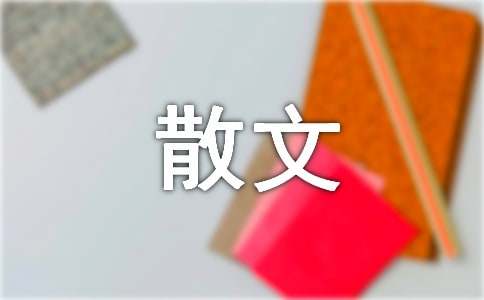- 相關推薦
漢譯英散文泥土的微笑賞析
千萬不能剪啊,玫瑰是泥土的微笑,誰忍心殺戮美得醉人的微笑?下面小編給大家分享一篇英譯漢文章《泥土的微笑》的賞析,歡迎閱讀!

泥土的微笑
Smile of the Earth
“泥土”一詞并不是指“泥”,而是指“土”、“土地”,所以譯為the earth。Smile表達的是一種歡樂的情緒,而不僅僅是“笑容、微笑”的意思。
我在花園里種滿了芬芳的玫瑰花,遠遠望去,像一片燃燒的晚霞。我想等朋友來做客的時候,讓他們攜帶些玫瑰回家。我相信朋友捧著火紅的玫瑰漸漸走遠的背影,一定能點燃易感的情懷。
All over my garden I've planted nothing but roses, fragrant and--If looked at from afar--ablaze with colour like sunset clouds. I would be very happy if any one of my visiting friends should desire to pick and take some for their homes. I trust that any friend of mine carrying the roses would vanish into the distance feeling that his emotion had been rekindled.
譯這一句時要注意中文的說話方式:我......玫瑰花,(我或者人們)遠遠望去,(玫瑰)像一片......,我......讓他們......。中文敘事的角度是不停變化的,而且,第一部分“我......玫瑰花”重點是在“種滿了”上。譯文考慮了這些因素,將“種滿了”用all over my garden放到句首加以突出,使這一部分所表達的意思在語氣的分量上與原文相當。然后用"I"作為主語,把整句串起來,作為這一段敘述的中心。
“我想”是說我的一種愿望,所以譯為I would be very happy if...; should是表示將來的一種可能性;for their homes看似與原文不符,但原文的“帶......回家”并不是說帶回去就完事了,而是說要用玫瑰花裝點居室,帶花為的是(for)美化他們的家。
朋友并非特指哪一位,而是任何一位,所以譯為any friend of mine。“點燃”此處譯為rekindled,而不是kindled,是因為原文含義指人們原先有過的,現已淡忘的“情懷”被重新點燃。
有一天,一位非常要好的女友來探望我,我知道她平素最喜歡花花草草了,臨別時我說,采一束玫瑰點綴你的閨房,保證十里飄香。
A close friend came for a visit the other day. I know her to be a lover of flowers and plants, and for that reason I told her at her departure that she should pick a bunch of roses to decorate her boudoir. I promised that the scent of the roses would be wafted far, far away.
“探望我”也可以譯為came to visit me,但came for a visit更好,既然是come且visit,被訪者當然就是“我”了,這句也體現了英語介詞多的特點。
“女友”只譯作friend,而在后面某處說girl friend,是因為英語中girl friend也有“戀愛對象”的意思,為避免誤會,先不譯,而放到后面,譯為That girl friend of mine。況且作者是男是女我們并不知道。
“平素最喜歡”英語可以說she loves...,但更合乎習慣的說法是she's a lover of...,另如He's a good driver是說他開車開得好。
for that reason是根據原文的句間含義加上的,把中文的意義關聯,改為英文的形式關聯。
“十里飄香”:中文用數字往往虛指,此處“十里”便并不表示實際的距離,而是說花香濃郁幽遠,所以譯為would be wafted, far away。
女友輕輕跨進花園,東聞聞,西嗅嗅,神采飛揚,就是不肯采摘。我說沒關系,多的是,我又不是花店的老板,不會靠玫瑰賺錢的。說完我就舉起剪刀準備獻美。女友急忙攔住,高聲叫著不可不可。
That girl friend of mine, tiptoeing into the garden in high spirits, sniffed here and smelt there, but in the end she didn't pick a single rose. I said there were so many of them that she could pick as many as she'd like to; I told her that I was not a florist and didn't make a living out of them. While saying so I raised the scissors for the sacrifice of the flowers, but she vehemently stopped me, crying no, no, no!
“不肯采摘”譯成英語時必須有賓語,考慮到語句的連貫,再加上語氣方面的緣故,譯成了didn't pick a single rose。
這里中文的意思是說:你采吧,采多少都沒關系,因為我這里玫瑰花多的是,而且我又不是開花店的,不以此謀生。中文的意義關聯十分明顯。根據這一分析,英文便把“沒關系”隱去了。
make a living out of: 從......中謀得生活來源。
while表示的是同時,vehemently表示的是激烈的態度,句末的感嘆號更是表明了阻止剪花的決心,因為英語里感嘆號用的很少,表示的感情也較為激烈。
這么美麗的玫瑰剪下來,讓人心疼。她抓緊我的袖子叮嚀:千萬不能剪啊,玫瑰是泥土的微笑,誰忍心殺戮美得醉人的微笑?
To cut such beautiful roses would hurt one, she said. With her hands clutching at my sleeves, she told me that by no means should they be cut. Roses are the smiling face of the earth, and who could be so iron-hearted as to destroy a smile so exhilarating?
讓人心疼:hurt one是使某人傷心的意思,也可以說gives one heartache。
這一句的英文分成了兩句,因為從意思上來看,“千萬不能剪啊”有語氣詞在末尾,語氣較重,單獨處理較好。后面的兩個“微笑”相互呼應,放到一起比較合適。
我的靈魂悚然一驚,丑陋的泥土,卑微的泥土,樸素的泥土,因為玫瑰,露出了驚艷一笑。因為這一笑,讓人愛惜非常。
My mind was thoroughly boggled: the ugly earth, the humble earth, the plain earth--it is only because of the roses that it reveals an amazing and bright smile, and it is for the sake of that smile that it wins the care and pity of men.
“靈魂”實際指的是心靈、良心,所以英文意為mind;
“悚然”是說由于驚覺、害怕而猶疑,正好是英文boggle的意思。
下面三個“......的泥土”并列為“露出了驚艷一笑”的主語,“因為”后面則是“這一笑”作主語,“讓人愛惜非常”作謂語。
“驚艷”指這種微笑出現在如此不起眼的泥土里,既使人感到意外,有讓人覺得燦爛無比,所以譯為amazing and bright。
這里使用了兩個強調句,為的也是突出這種反差。譯這一個句子時考慮得最多的是中文的松散結構,怎樣合理地轉換成英文的句子。下面一句里,這種松散的特點可以說發揮到了極致。
一個朋友在拍賣會上有幸購得一個花瓶,花瓶細頸大肚,碎花藍白調子,流光溢彩。從造型到色彩,整個如唐朝盛世的化身,雍容,華貴,高傲,悠閑,目空一切。朋友請我們大家觀賞。奇怪的是每一個參觀者都小心謹慎,生怕碰壞這盛唐的寶貝。其實不過是一撮泥土,經過窯燒才千修百煉成瓷中經典。
Of late a friend of mine invited me to appreciate a Tang Dynasty vase that he was fortunate enough to have bought at an auction. The vase, with its slim neck, plump body, and fine little flowers on a blue and white background, has a noble shape and a rich colouring, elegant, refined, proud, poised, and supercilious, an extreme embodiment of the prosperity of the Tang Dynasty. I was filled with wonder to think that while everyone present was taking great care not to cause the slightest damage to the Tang treasure, it was to me nothing but an object made of clay. It had only become a piece of classic art after being baked in a china kiln.
這句的重點是看花瓶,花瓶怎么來的就不那么重要,所以譯為從句。句子用了of late開頭,使上下文連接通順,沒有這樣一個短語,英文前后這兩句是銜接不好的。
at an auction:這里用介詞at,而不硬套中文用on。
后半句頗費思量。考慮到英文也可用介詞引導一連串詞組作定語,所以便用with引導三個名詞詞組,整句其實是把原文的意思融合后譯出的,譯文中的詞或詞組并不一定與原文的詞或詞組一一對應,如noble shape就兼有“雍容、華貴”和“造型”的意思,rich colouring含“色彩”、“流光溢彩”、“華貴”等幾重意義。所以這句譯時并非詞對詞,那樣很難將原文的所有涵義完全譯出。
filled with wonder:心里覺得奇怪,很想知道。
slightest原文中并沒有,來自“小心謹慎”和“生怕”所包含的意思,中文“生怕”后面沒有說出來的下半截話應該是“(生怕)......一點點”。
the Tang treasure:原文是“盛唐”,但這個意思已在前文譯出,所以不再重復。
“其實”沒有直接譯出,因為這個意思是存在于上下句之間的,而且后面還有only一詞,因此沒有太大必要用in fact或者actually。
“瓷中經典”也已隱含在the Tang treasure當中,因此就簡單地譯成了after being baked in a china kiln。
江南的紫砂壺玲瓏剔透,泥人張的彩塑令人拍案叫絕,它們不都是泥土的微笑嗎?彌足珍貴。即使曾丑陋,即使曾卑微,即使曾樸素,同樣讓人肅然起敬。
Both the exquisiteness of the boccaro teapots made in south China, and the shockingly beautiful sculptures by Clay Sculptor Zhang of Tianjin--aren't they all smiles of the earth? They are such exquisite treasures that--even if they look ugly, humble, plain, or whatever--they no doubt deserve respect and veneration.
the shockingly beautiful sculptures by Clay Sculptor Zhang of Tianjin:中文可以很簡潔地說“泥人張”,英文也可直接譯成Clay Sculptor Zhang。
中文可以接著上文說“彌足珍貴”,但英文則必須有主語,且意思上是與后面的句子連在一起的,所以便用such...that這樣的結構譯出了。
我懂得了,即使再平凡的人,也沒有理由被埋沒,只要努力活出色彩,一定叫人刮目相看。
Now I understand that no-one, however ordinary, should be condemned to anonymity, and that anyone who adds a dash of colour to life deserves our respect.
中文的語氣是“無論是誰,都不應當......”,換成英文的習慣就是用否定代詞說no-one...;中文可以用動詞的主動形式表示被動,而到了英文里就需要用被動的形式,盡管英文里也有為數不多的幾個動詞有這樣的用法。所以這里用了should be condemned to anonymity。
中文的“刮目相看”是“用新的眼光看待”,此處意譯為deserve our respect,因為將它理解為treat sb. with more respect比look at sb. with new eyes更好一些。
【漢譯英散文泥土的微笑賞析】相關文章:
胡適散文差不多先生漢譯英欣賞06-04
散文太陽英譯賞析08-05
散文蟋蟀英譯賞析10-07
英譯散文賞析《書房》10-25
散文巷英譯賞析10-17
散文霧的英譯賞析08-03
中國散文杜鵑的英譯賞析07-18
散文論包裝英譯賞析10-21
英譯散文賞析:書與人09-28
散文長壽之道英譯賞析05-03